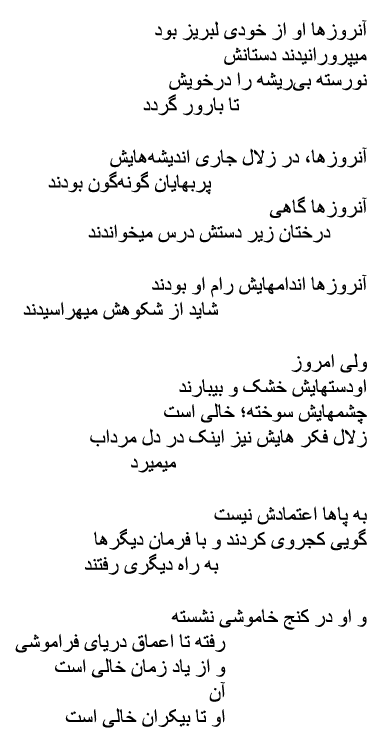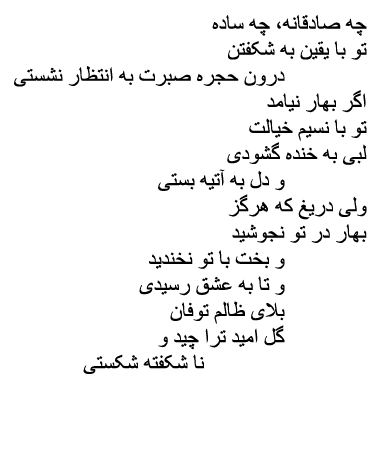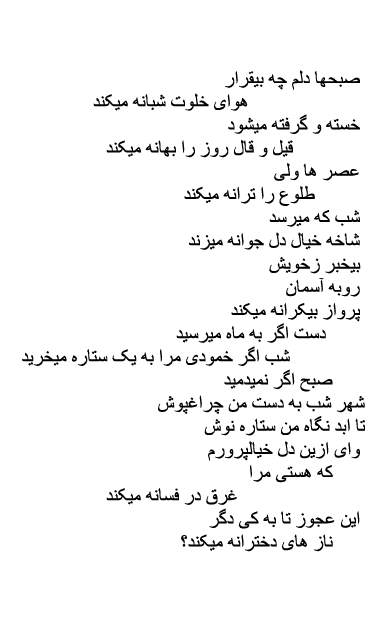Four poems by Afghan poet Nadia Anjuman, translated from Dari by Diana Arterian and Marina Omar.
Nadia Anjuman’s poetry startles. When considered in conjunction with the knowledge of her young age, it provokes something deeper, less easily pinned down. Her poems are in turns playful, hopeful, devout, despondent. She leans on imagery of the garden and the stars, as well as the body. Despite the difficulty of her life and the content of the poems, one of her most remarkable and consistent habits is her hopefulness. Many of Anjuman’s pieces show her coaxing herself into optimism and rationality.
As a teenager in Herat, Nadia Anjuman attended the Golden Needle School. Under the guise of practicing needlepoint (a pastime approved by the Taliban government), a group of women gathered to meet and discuss literature with local professors. In 2001, with Afghanistan’s liberation from the Taliban, Anjuman began attending Herat University and soon published a book of poetry entitled Gul-e-dodi (Dark Flower). In Gul-e-dodi, Anjuman portrayed the difficult realities of her life and thus her generation of Afghani women, those with few rights who had been raised during the reign of a violent and oppressive governmental power. Her readership was not limited to Afghanistan—Gul-e-dodi found readers in Iran, Pakistan, and beyond. As a result of her writing, Anjuman was awarded scholarships and fellowships. She continued to write poetry despite the objections of her husband and his family, and she was set to publish a second volume of poetry in 2006 entitled Yek Sàbad Délhoreh (An Abundance of Worry).
Anjuman was killed in November of 2005 at the age of twenty-five. While the particulars of her death remain unclear, it appears that it was the result of a physical struggle between Anjuman and her husband. In 2007, Anjuman’s complete works (entitled Divâne Sorudehâye Nadia Anjoman: The Book of Poems of Nadia Anjuman) were published by the Iranian Burnt Books Foundation. Gul-e-dodi has been reprinted three times and sold over three thousand copies. As I continue to work on translating Anjuman’s poems—sending them out for publication, applying for grants, talking to people about her—I hope to avoid trapping her in the common tropes of the young genius, the dead woman writer, and/or the oppressed Afghani woman. The details of her life do not eclipse the brilliance of her verse.
—Diana Arterian
Rich
by Nadia AnjumanOne day my thoughts, instead of a chill
will bring fireworks
One day my eyes will be wide open
such that
in seeing the shrunken leaves of the ocean, they continue flowing
One day my hands will become weavers
and upon life’s wasteland of a body
spin a gown with wheat and flowers
One day a lullaby
will bring sleep to the weary eyes of homeless children
One day I will sing praise
to the spirit of fire
with soothing songs of rain
On that day
I will write a rich and exalting poem
with the sweetness of a tree’s fruit and the beauty of the moon
Sarataan 1380 / Summer 2001
translated from Dari by Diana Arterian & Marina OmarEternal Pit
by Nadia AnjumanOnce she was filled with the familiar
Her hands planted the rootless sprig
with intuition—
so it would grow
Once, in the bright spring of her mind
ran many great thoughts
Once, at times
her hand tamed the trees
Once even her guts were obedient
perhaps they feared her power
But today
her hands are wasted and idle
her eyes burnt sockets
her bright thoughts are buried in a swamp
fading
She distrusts even her feet
They defy her
taking her where she doesn’t want to go
She sits in a corner of quiet
lost in a sea of darkness
emptied of the thought of time
That
eternal pit
Sawr 1380 / Spring 2001
translated from Dari by Diana Arterian & Marina OmarFailure
by Nadia AnjumanHow sincere, how pure
You, with such faith in your blossoming
ready in your chamber of patience
Spring did not come
and you with your airy dreams
only smiled
and looked with your heart toward the future
But sadly
spring never stirred within
and luck didn’t smile on you
and when you found love
the harsh trial of that storm
plucked your bud of hope and
and you snapped before opening
Asad 1380 / Summer 2001
translated from Dari by Diana Arterian & Marina OmarGirlish Heart
by Nadia Anjuman
Each morning my heart is restless –
it longs for night’s solitude
becomes weary and joyless
peeved by the day
And yet in the afternoon
it sings for sunrise
When night falls
the branch of my heart’s fantasy grows
innocent of itself
Facing the sky
it flies upward, infinitely
(If my hand reached the moon
If the night bought my relief from a star
If the sun did not rise…
I would cover the city of night with lights
to gaze forever, star-drunk…)
Oh, my dreaming heart
you drown my days
in fantasy
How long will this old woman of a heart
move like a girl?
Swar 1379 / Spring 2000
translated from Dari by Diana Arterian & Marina Omar




